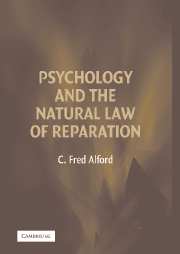3 - Natural Law and Natural Evil
Published online by Cambridge University Press: 24 July 2009
Summary
Recall that it is the paradigmatic natural law theorist, Thomas Aquinas, who defines the prime principle of natural law as do good, avoid evil (ST I–II 94, 2). For some of the new natural law theorists, as they are called, such as Finnis (1980), and George (1999), the statement is strictly analytic, true by virtue of the way we use the terms good and evil. From the perspective of Melanie Klein, the prime principle of natural law is filled with empirical content. Do good, avoid evil assumes that that one has always already wanted to destroy the good because it is good, beyond me and my control, because the good is not me or mine. Knowing one's evil means knowing something of the power of the death drive within oneself, one's lust to destroy the good. That too is part of the history of that telluric place where Steiner finds Antigone's inspiration. It is the same place where Milton's Satan resides in Paradise Lost, the place whose motto reads “Evil be thou my Good” (IV, 105–110).
In an important respect I agree with Russell Hittinger (2003), who argues that talk about natural law is today both abundant and degraded. Once natural law comes to be seen as an “instrument of persuasion,” its truth comes to be measured by its success in achieving consensus.
- Type
- Chapter
- Information
- Psychology and the Natural Law of Reparation , pp. 61 - 104Publisher: Cambridge University PressPrint publication year: 2006

